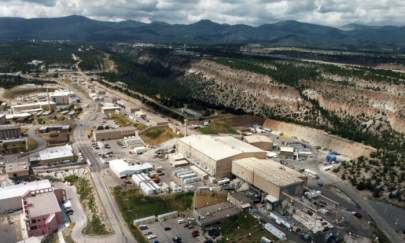162 Researchers From Top US Nuclear Facility Now Working for China: Report
More than 150 scientists who worked in a top U.S. national security laboratory were hired by the Chinese regime to do research, according to a new report. Much of that research has directly advanced Chinese military technology, which now threatens U.S. national security.
The report (pdf), published by strategic intelligence firm Strider Technologies, claims that the Chinese Communist Party (CCP) conducted a systemic effort to recruit leading scientists from Los Alamos National Laboratory (LANL) to work on its military programs.
Located in New Mexico, LANL is a key part of U.S. defense and security research and is where nuclear weapons were first developed. It is one of the largest scientific and technological institutions in the world, and its scientists conduct research in the fields of national security, space exploration, nuclear fusion, nanotechnology, and supercomputing.
At least 162 LANL researchers have been hired by the CCP over the last 35 years, according to the report. Of those, many went on to conduct military research for China, at least one of which previously held Top Secret security clearance at the U.S. Department of Energy.
“Former Los Alamos scientists have made, and continue to make, considerable contributions to [China’s] hypersonic, missile, and submarine programs that present an array of security risks for the United States and the entire free world,” the report said.
“Better protection is needed for the institutions, research programs, and scientists advancing innovation in this era of strategic competition without harming open scientific collaboration.”
A ‘Talent Superpower Strategy’
According to the report, the CCP leveraged a “Talent Superpower Strategy” wherein it incentivized academics, researchers, and scientists to go abroad, deepen their expertise, and return to China to advance the nation’s strategic interests.
Many of the researchers who came to the United States to be trained and work in areas critical to national security were involved in the CCP’s talent programs. At least 59 of those who worked at the LANL and subsequently returned to China to do research were part of the regime’s Thousand Talents Program or its youth branch.
The report said that the program and others like it were essentially designed to operate as an “exploitation” of the West’s commitment to global scientific collaboration.
Moreover, it said, such programs often required participants to host and train other Chinese researchers, frequently without notifying their host institution of the requirement. In this way, talent programs allowed Chinese researchers who earned jobs in the United States to serve as a bridgehead through which more could receive training.
“In effect, [Chinese] talent programs are ever-expanding recruitment networks,” the report said.
“Once inducted, participants are incentivized and obligated to identify top talent for placement in desirable research positions at their host institution and for eventual recruitment back to [China].”
China’s Military Paid for by US Tax Dollars
Of 113 LANL postdoctoral researchers and permanent staff members who returned to China, more than 79 percent were selected to participate in the CCP’s government talent programs, the report said. These researchers went on to contribute to the development of the CCP’s hypersonics program, jet engines, warheads, unmanned vehicles, and stealth submarines.
The report highlighted key examples of how this process worked through an exploration of the careers of a number of associated researchers who worked at LANL and later were hired by China.
One such figure is Chen Shiyi.
Chen is an expert in fluid dynamics and turbulence who spent a number of years in the 1990s at the LANL as an Oppenheimer Fellow. After returning to China in 2005, Chen served as vice president for research at Peking University and later president of the Southern University of Science and Technology in Shenzhen, where he began recruiting scientists with deep links to LANL.
Among those Chen recruited was Zhao Yusheng, a scientist who worked at LANL for more than 18 years.
During that time Zhao’s projects received more than $19.8 million in grant funding from the U.S. government. Among the research those grants funded was work on deep-earth penetrating warheads, the report revealed.
Zhao, in turn, on his own supervised and sponsored at least 25 postdoctoral researchers, at least eight of whom were from China and later returned to do work there.
Further, one of the postdoctoral researchers whom Zhao trained and who returned to China soon after filed a national defense patent for a similar technology based on his own work on deep-earth penetrating warheads.
That researcher is now affiliated with the Chinese Academy of Engineering Physics, which is the CCP’s primary organization for conducting the research, development, and testing of nuclear weapons, according to the report.
It is through this network approach of sprawling and intertwined research relationships that the CCP has garnered for itself a cadre of highly respected military researchers, all of whom received training and employment in the United States at U.S. taxpayer expense.
Indeed, so widespread were connections from LANL in China’s own military research scene, that a 2017 story in the South China Morning Post found that many of the scientists who had returned to China to work on military research referred to themselves as the “Los Alamos Club.”
The Strider report raises the question of whether this threat to national security might be more widespread, and notes that the LANL is just one institution out of hundreds employing participants in China’s talent programs.
“General Secretary Xi Jinping and other top CCP leaders, suggest that similar recruitment efforts may be widespread among U.S. government–funded laboratories, academic research institutions, and major centers of innovation,” the report said.
“These programs are leveraging taxpayer-funded research to advance [China’s] economic development and military modernization.”





